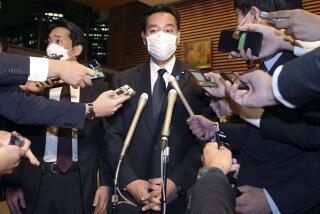Hata Decries Denial of WWII Atrocities : Japan: New Cabinet minister had called massacre of Chinese in Nanjing ‘a fabrication.’
- Share via
TOKYO — Prime Minister Tsutomu Hata on Wednesday issued a statement from Paris rebuking his justice minister for calling the 1937 Rape of Nanjing “a fabrication” and denying that Japanese acts in World War II constituted “aggression.”
Hata, on a tour of four European nations, said he had not yet contacted Shigeto Nagano, whom he named to his Cabinet just last Thursday as his new administration took office.
“But calling the Nanjing Incident a ‘fabrication’ is not an appropriate statement,” Hata said. “Acts of aggression and colonial rule by our country inflicted upon many people unbearable suffering and sadness.
“It is important for each Japanese to face history straight-on and share the resolve that these acts should not happen a second time,” Hata said in a statement that was also released here.
Nagano made the remarks in an interview published Wednesday morning in the Mainichi newspaper. “The Nanjing Incident and the rest was a fabrication. I was in Nanjing immediately after” Japanese soldiers seized the Chinese city on Dec. 13, 1937, the Mainichi quoted him as saying.
Nagano, himself a soldier at the time, later became a chief of staff of Japan’s postwar army, the Ground Self-Defense Forces.
Japanese soldiers killed more than 155,000 people in the six weeks after they seized Nanjing (Nanking) in eastern China and raped many women, according to the Tokyo War Crimes Tribunal conducted by American Occupation authorities after World War II. Chinese estimates put the death toll at 300,000.
The new justice minister also was reported as saying that “calling that war a war of aggression is incorrect. . . . We were seriously thinking about liberating colonies and (establishing) the (Greater East Asian) Co-Prosperity Sphere.”
The comments were a major embarrassment to Hata, who--even before joining the coalition government established last August--had urged Japan to apologize for its aggression, colonial rule and atrocities before and during World War II.
Former Prime Minister Morihiro Hosokawa, in his first news conference after taking office, flatly denounced Japan’s Pacific war as “a war of aggression. . . . It was a mistake.”
On trips to China and South Korea before he announced April 8 his intention to resign, Hosokawa apologized for Japanese aggression against China and for a 35-year colonial rule of Korea.
Hosokawa’s admission of aggression, the first such unqualified declaration by any Japanese prime minister, brought protests from veterans groups and the Liberal Democratic Party, which lost its 38-year grasp on power last summer.
Yohei Kono, the LDP president, insisted that “not all parts” of the war constituted aggression. Later, asked what parts were not aggression, Kono said that young Japanese soldiers did not go to war in the belief that they were committing aggression.
Nagano’s statements were the latest in a sporadic series of outbursts from conservative politicians who have tried to play down Japan’s guilt for aggression dating back to its 1931 invasion of Manchuria.
Newspapers in Seoul prominently reported the remarks. The Dong-A Ilbo said in an editorial that the comments showed that “an inclination toward militarism still lives in the consciousness of Japanese leaders.”
China’s Foreign Ministry said in a statement today that the Beijing government was “shocked and indignant,” and it urged the Japanese government to deal with Nagano’s remarks with “an earnest and serious approach . . . to safeguard bilateral relations.”
More to Read
Sign up for Essential California
The most important California stories and recommendations in your inbox every morning.
You may occasionally receive promotional content from the Los Angeles Times.













